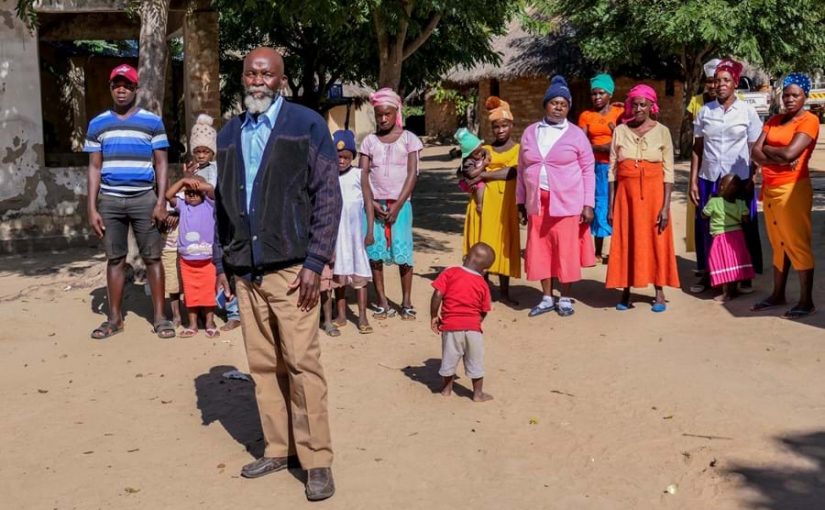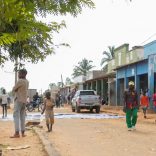Mozambique: N1 blocked after child hit by police bullet dies
Pedro – 71 years old, 13 wives and 44 children of polygamy in Mozambique

Photo: Lusa
- In Mozambique, polygamy is not legalized, but nor is not a crime. Depending on the context, it is even a tradition which meets with some acceptance.
Pedro Faricai, 71, says he continues to ‘spread romance’ among the 13 wives with whom he shares a handful of precarious dwellings in Mpandeia, a village in the mountain range that separates Mozambique and Zimbabwe.
He married his first wife late, in 1978, at the age of 27. The following year he shared a roof and bed with a second wife, before leaving for Zimbabwe with both of them, fleeing the 16-year civil war in the country.
He returned in 1987 with five wives, and ‘hooked’ the other three in a camp for displaced people in Zimbabwe, Mozambican refugees to whom he promised “much love” on their return to their homeland.
“I came to have as many as 17 wives. Two died, I divorced two others and at the moment I have 13 wives,” he says in a proud and serene tone, surrounded by nine of them, while another four are working in the fields.
“I conquered three wives for my husband”
In Mozambique, polygamy is not explicitly legalized, but nor is it a crime. Depending on the context, it is even a tradition which meets with some acceptance – albeit a tradition that consigns women to poverty, especially in rural areas, warn organisations that study the subject.
A feminist movement, led by WLSA Mozambique, the Mozambican branch of the NGO Women and Law in Southern African Research and Education Trust , has been fighting polygamy since some MPs tried to include it in the draft Family Law in 2003.
The idea did not proper, but the debate continues, with several organizations issuing warnings that, with the high prevalence of the HIV virus in Southern Africa, polygamy in Mozambique would provide “fertile ground” for the spread of AIDS.
More debate followed, but no consensus was to be found in Mozambican society. A believer in the John Marange sect, a group known for banning conventional medicine and promoting polygamy, Pedro Faricai tells Lusa that he continues to “smash it” in places of worship, where he won most of his wives, almost all of them faithful of the cult.
“I still feel the will to marry others, but I won’t anymore, that’s enough,” he says with an embarrassed smile in his long beard, with the shaved and shining head typical of men of the Marange sect.
Pedro Faricai’s closest competitor in the village of Mpandeia has three wives and eight children. Most men In the region stop at a second wife.
At the moment, with 44 children, 53 grandchildren and some of his wives pregnant (according to a count in June), Pedro Faricai explains that he entered polygamy – a hereditary practice in his family – because he did not want to grow old “unfortunate and lonely”.
“I sat down with my wife and I said, ‘I want to add wives,’ and she asked why. I said ‘We are getting older; what will it be like when we get to old age? The children will grow up and leave for marriage, how will we live?’ And she accepted.”
The first wife even helped him find others, the man with a robust body and determined look tells Lusa, without appearing to be 71 years old.
“This makes me very happy because whenever I want, they are always here,” he says.
Faricai’s also enjoys a reputation as one of the best tomato producers in Manica province, a supplier to the central provinces of the country – a source of income and family support, and funds to conquer more wives.
This farmer’s family is structured. Orders of the house always come from him and there are rare occasions when any decision is delegated to another wife – except for family governance matters, where the organisation takes on a certain complexity. Such matters must involve the first wife, plus two others chosen on a case-by-case basis and two sons, his heirs.
“When night comes, I gather all the wives and say prayers, as usual,” and it is on these occasions, he continued, that house plans are outlined, problems are presented and news is announced.
At this meeting, the wives are prohibited from presenting their personal needs, which must be spelled out in a low voice on the night scheduled for the husband to visit them.
“I helped him to have more wives. In all, I conquered three wives for my husband,” recounts Mivisse Jeque, the first of the wives, proudly.
Pedro Faricai has his own house, the only one with a television, a true centre of power.
This is where he lives and where he receives the wives he chooses to spend the night with, on the days when he decides not to go to their huts, spread across the large backyard in the middle of nowhere.
The provinces of Manica and Tete, in central Mozambique, as well as the province of Gaza, in the south, have the most polygamous unions. The tradition is entrenched in the most remote areas, and is not a matter of debate.
Polygamy is one of the recurring themes in the work of Paulina Chiziane, a Mozambican writer who takes the struggle for the emancipation of women as one of the guiding threads of her work, and in 2021, at the age of 66, won the Camões Prize.
The idea leaves Pedro Faricai unperturbed. He insists that, had he been successful in all his attempts to “spread the love”, his current tally of wives would be still higher.
“Many parents refused to give me their daughters in marriage,” he recalls with a characteristic laugh, but this time a laugh with which he tries to hide the pride wounded by his failure to ‘hook’ yet another woman.












Leave a Reply
Be the First to Comment!
You must be logged in to post a comment.
You must be logged in to post a comment.